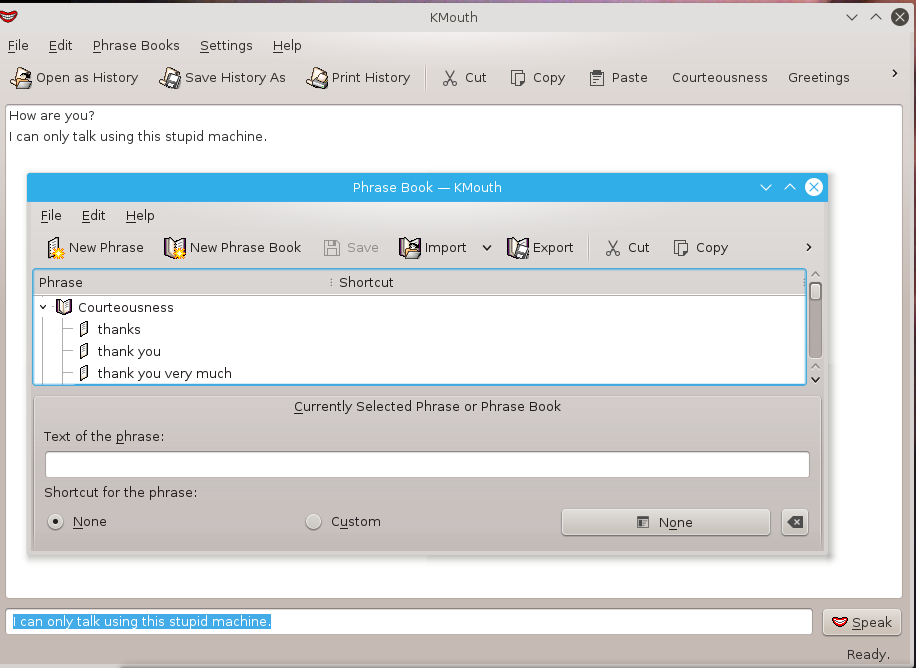Speech Dispatcher 0.8.3
=====================
Announcing the availability of Speech Dispatcher 0.8.3 developed as a part of
the Free(b)Soft project.
* What is new in 0.8.3?
- Add API methods to get language, rate, pitch, and volume.
- A lot of code cleanup, and compatibility improvements.
- Removed all references to GNOME Speech, since it has long since been
deprecated.
- Fix some inconsistancy in the SSIP API for voice type.
- The SET VOICE SSIP command is now deprecated, and will be removed in 0.9.
- The C library API now provides macro definitions for major, minor, and micro
versions in libspeechd_versions.h.
- The libsndfile library is now a mandetory dependency to improve the user
experience around sound icons.
- Fix a possible crash in the festival driver.
- Add a configuration option to the espeak driver to show voice variants in
the voice list. This will remain until a proper variants retrieval API is
added for compatible synthesizers.
* Where to get it?
You can get the distribution tarball of the released version from
http://www.freebsoft.org/pub/
We recommend the use of sound icons with Speech Dispatcher.
They are available at
http://www.freebsoft.org/pub/
Corresponding distribution packages should soon be available at
your distribution mirrors.
The home page of the project is http://www.freebsoft.org/
* What is Speech Dispatcher?
Speech Dispatcher is a device independent layer for speech
synthesis, developed with the goal of making the usage of speech
synthesis easier for application programmers. It takes care of most
of the tasks necessary to solve in speech enabled applications. What
is a very high level GUI library to graphics, Speech Dispatcher is
to speech synthesis.
Key Speech Dispatcher features are:
- Message priority model that allows multiple simultaneous
connections to Speech Dispatcher from one or more clients
and tries to provide the user with the most important messages.
- Different output modules that talk to different synthesizers so
that the programmer doesn't need to care which particular
synthesizer is being used. Currently Festival, Flite, Epos, Espeak
and (non-free) Dectalk software, IBM TTS, Pico and others are
supported. Festival is an advanced Free Software synthesizer
supporting various languages. Espeak is a very fast multi-lingual
Free Software synthesizer.
- Simple interface for programs written in C, C++ provided through a
shared library. Python, Common Lisp and Guile interfaces. An Elisp
and Java libraries are developed as sperate projects speechd-el
and speechd-java. Possibly an interface to any other language can
be developed.
* How to report bugs?
Please report bugs at https://its.freebsoft.org/its/
For other contact please use either the above link or our mailing list
<speechd@lists.freebsoft.org> .
Happy synthesizing!
=====================
Announcing the availability of Speech Dispatcher 0.8.3 developed as a part of
the Free(b)Soft project.
* What is new in 0.8.3?
- Add API methods to get language, rate, pitch, and volume.
- A lot of code cleanup, and compatibility improvements.
- Removed all references to GNOME Speech, since it has long since been
deprecated.
- Fix some inconsistancy in the SSIP API for voice type.
- The SET VOICE SSIP command is now deprecated, and will be removed in 0.9.
- The C library API now provides macro definitions for major, minor, and micro
versions in libspeechd_versions.h.
- The libsndfile library is now a mandetory dependency to improve the user
experience around sound icons.
- Fix a possible crash in the festival driver.
- Add a configuration option to the espeak driver to show voice variants in
the voice list. This will remain until a proper variants retrieval API is
added for compatible synthesizers.
* Where to get it?
You can get the distribution tarball of the released version from
http://www.freebsoft.org/pub/
We recommend the use of sound icons with Speech Dispatcher.
They are available at
http://www.freebsoft.org/pub/
Corresponding distribution packages should soon be available at
your distribution mirrors.
The home page of the project is http://www.freebsoft.org/
* What is Speech Dispatcher?
Speech Dispatcher is a device independent layer for speech
synthesis, developed with the goal of making the usage of speech
synthesis easier for application programmers. It takes care of most
of the tasks necessary to solve in speech enabled applications. What
is a very high level GUI library to graphics, Speech Dispatcher is
to speech synthesis.
Key Speech Dispatcher features are:
- Message priority model that allows multiple simultaneous
connections to Speech Dispatcher from one or more clients
and tries to provide the user with the most important messages.
- Different output modules that talk to different synthesizers so
that the programmer doesn't need to care which particular
synthesizer is being used. Currently Festival, Flite, Epos, Espeak
and (non-free) Dectalk software, IBM TTS, Pico and others are
supported. Festival is an advanced Free Software synthesizer
supporting various languages. Espeak is a very fast multi-lingual
Free Software synthesizer.
- Simple interface for programs written in C, C++ provided through a
shared library. Python, Common Lisp and Guile interfaces. An Elisp
and Java libraries are developed as sperate projects speechd-el
and speechd-java. Possibly an interface to any other language can
be developed.
* How to report bugs?
Please report bugs at https://its.freebsoft.org/its/
For other contact please use either the above link or our mailing list
<speechd@lists.freebsoft.org> .
Happy synthesizing!

